London's pollinators: Creating a buzz in the capital
Existing opportunities for making significant progress are highlighted in the report, as well as areas in need of more action. The report asks; how do we best monitor pollinator populations and record a baseline from which increases or declines can be measured? Noting the recent surge in the number of managed colonies of bees, we explore how we can tackle the potential challenges this may present, whilst making the most of the informed and engaged community of beekeepers.
We focus in on the different land uses of the city and ask how we can protect beneficial habitats that already exist and enhance those that are currently under-utilised. We explore the potential to create new habitat and finally, acknowledging the need for a landscape-scale approach to conservation, we explore what approaches should be undertaken to ensure that habitats link as part of a larger network.
In compiling the report Capital Bee has drawn on the knowledge and expertise of a range of organisations from across the capital, each committed to reversing the decline of pollinators and helping us to reconnect to the natural world. In bringing together the diverse strands of discussion, we hope that the report will help to inform a conversation on developing a coordinated set of activities to promote and protect London’s pollinators that may be adopted by a range of bodies and organisations.
Contents
- Foreword
- Introduction
- Our aim
- Working together
- Creating a buzz in the capital - a unique opportunity
- The current status of London’s pollinators
- The value of London’s pollinators
- Protecting our green city
- Key pollinator-friendly policies
- Measure it - the importance of polinator monitoring
- The rise of urban beekeeping
- The importance of healthy hive management
- Engaging in wider wildlife conservation
- Protecting land for pollinators
- The importance of planning to protect wildlife sites
- The vital importance of private gardens
- The importance of wildlife-rich brownfield sites
- Enhancing land for bees
- Pollinator-friendly councils
- Pollinator-friendly green infrastructure and ‘soft estate’
- Pollinator-friendly housing estates
- Pollinator-friendly allotments and food growing sites
- Pollinator-friendly brownfield sites
- Pollinator-friendly green-space management by private contractors
- Pollinator-friendly domestic gardens
- Pollinator-friendly London garden centres and DIY stores
- A pollinator-friendly approach to pest management
- Creating space for pollinators
- Pollinator-friendly green roofs
- Pollinator-friendly sustainable urban drainage systems
- Pollinator-friendly street trees
- Linking space and creating B-lines
- Endnotes and references
Published Thursday 15 January 2015
London Food Link: London Food Link brings together community food enterprises and projects that are working to make good food accessible to everyone in London to help create a healthy, sustainable and ethical food system for all.
